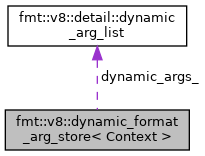#include <args.h>

Classes | |
| struct | need_copy |
Public Member Functions | |
| constexpr | dynamic_format_arg_store ()=default |
| template<typename T > | |
| void | push_back (const T &arg) |
| template<typename T > | |
| void | push_back (std::reference_wrapper< T > arg) |
| template<typename T > | |
| void | push_back (const detail::named_arg< char_type, T > &arg) |
| void | clear () |
| void | reserve (size_t new_cap, size_t new_cap_named) |
Private Types | |
| using | char_type = typename Context::char_type |
| template<typename T > | |
| using | stored_type = conditional_t< detail::is_string< T >::value &&!has_formatter< T, Context >::value &&!detail::is_reference_wrapper< T >::value, std::basic_string< char_type >, T > |
Private Member Functions | |
| unsigned long long | get_types () const |
| const basic_format_arg< Context > * | data () const |
| template<typename T > | |
| void | emplace_arg (const T &arg) |
| template<typename T > | |
| void | emplace_arg (const detail::named_arg< char_type, T > &arg) |
Private Attributes | |
| std::vector< basic_format_arg< Context > > | data_ |
| std::vector< detail::named_arg_info< char_type > > | named_info_ |
| detail::dynamic_arg_list | dynamic_args_ |
Friends | |
| class | basic_format_args< Context > |
Detailed Description
template<typename Context>
class fmt::v8::dynamic_format_arg_store< Context >
\rst A dynamic version of fmt::format_arg_store. It's equipped with a storage to potentially temporary objects which lifetimes could be shorter than the format arguments object.
It can be implicitly converted into ~fmt::basic_format_args for passing into type-erased formatting functions such as ~fmtvformat. \endrst
Member Typedef Documentation
◆ char_type
|
private |
◆ stored_type
|
private |
Constructor & Destructor Documentation
◆ dynamic_format_arg_store()
|
constexprdefault |
Member Function Documentation
◆ clear()
|
inline |
Erase all elements from the store
◆ data()
|
inlineprivate |
◆ emplace_arg() [1/2]
|
inlineprivate |

◆ emplace_arg() [2/2]
|
inlineprivate |

◆ get_types()
|
inlineprivate |
◆ push_back() [1/3]
|
inline |
Adds named argument into the dynamic store for later passing to a formatting function. std::reference_wrapper is supported to avoid copying of the argument. The name is always copied into the store.

◆ push_back() [2/3]
|
inline |
\rst Adds an argument into the dynamic store for later passing to a formatting function.
Note that custom types and string types (but not string views) are copied into the store dynamically allocating memory if necessary.
Example**::
fmt::dynamic_format_arg_store<fmt::format_context> store; store.push_back(42); store.push_back("abc"); store.push_back(1.5f); std::string result = fmt::vformat("{} and {} and {}", store); \endrst

◆ push_back() [3/3]
|
inline |
\rst
Adds a reference to the argument into the dynamic store for later passing to
a formatting function.
Example**::
fmt::dynamic_format_arg_store<fmt::format_context> store;
char band[] = "Rolling Stones";
store.push_back(std::cref(band));
band[9] = 'c'; // Changing str affects the output.
std::string result = fmt::vformat("{}", store);
result == "Rolling Scones" \endrst

◆ reserve()
|
inline |
\rst Reserves space to store at least new_cap arguments including new_cap_named* named arguments. \endrst
Friends And Related Function Documentation
◆ basic_format_args< Context >
|
friend |
Member Data Documentation
◆ data_
|
private |
◆ dynamic_args_
|
private |
◆ named_info_
|
private |
The documentation for this class was generated from the following file:
- third_party/spdlog/include/spdlog/fmt/bundled/args.h
